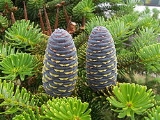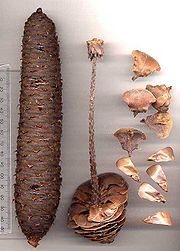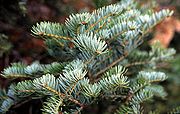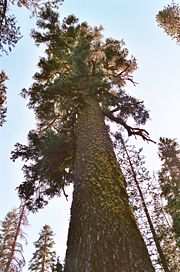
Fir
Encyclopedia
Firs are a genus of 48–55 species of evergreen
conifers
in the family Pinaceae
. They are found through much of North and Central America, Europe, Asia, and North Africa, occurring in mountain
s over most of the range. Firs are most closely related to the cedars (Cedrus); Douglas-firs are not true firs, being of the genus Pseudotsuga.
All are tree
s, reaching heights of 10–80 m (30–260 ft) tall and trunk diameters of 0.5–4 m (2–12 ft) when mature. Firs can be distinguished from other members of the pine family by their needle-like leaves
, attached to the twig by a base that resembles a small suction cup; and by erect, cylindrical cones
5–25 cm (2–10 in) long that disintegrate at maturity to release the winged seed
s. Identification of the species is based on the size and arrangement of the leaves, the size and shape of the cones, and whether the bract scales of the cones are long and exserted, or short and hidden inside the cone.
Abies lasiocarpa—Subalpine Fir
Abies lasiocarpa var. bifolia—Rocky Mountains Subalpine Fir
Abies sibirica—Siberian Fir
Abies sachalinensis
—Sakhalin Fir
Abies koreana—Korean Fir
Abies nephrolepis
—Khinghan Fir
Abies veitchii—Veitch's Fir



Abies pinsapo—Spanish Fir
Abies numidica
—Algerian Fir
Abies cilicica
—Syrian Fir

of most firs is considered unsuitable for general timber
use, and is often used as pulp or for the manufacture of plywood
and rough timber. Because this genus has no insect or decay resistance qualities after logging, it is generally recommended for construction purposes as indoor use only (e.g. indoor drywall framing). This wood left outside can not be expected to last more than 12–18 months depending on the type of climate it is exposed to. It is commonly referred to as several different names which include North American timber, SPF (spruce, pine, fir) and whitewood.
Nordmann Fir
, Noble Fir
, Fraser Fir
and Balsam Fir
are very popular Christmas tree
s, generally considered to be the best trees for this purpose, with aromatic foliage that does not shed many needles on drying out. Many are also very decorative garden trees, notably Korean Fir
and Fraser Fir, which produce brightly coloured cones even when very young, still only 1–2 m (3–6 ft) tall. Other fir trees can grow anywhere between 30 and 236 feet tall. Fir Tree Appreciation Day is June 18th.
Firs are used as food plants by the caterpillar
s of some Lepidoptera
species, including Chionodes abella
(recorded on White Fir
), Autumnal Moth
, Conifer Swift
(a pest of Balsam Fir
), The Engrailed
, Grey Pug
, Mottled Umber
, Pine Beauty
and the tortrix moths Cydia illutana
(whose caterpillars are recorded to feed on European Silver Fir cone scales) and C. duplicana
(on European Silver Fir bark around injuries or canker
).
Abies webbiana or Talispatra is used in Ayurveda as an antitussive drug.
Evergreen
In botany, an evergreen plant is a plant that has leaves in all seasons. This contrasts with deciduous plants, which completely lose their foliage during the winter or dry season.There are many different kinds of evergreen plants, both trees and shrubs...
conifers
Pinophyta
The conifers, division Pinophyta, also known as division Coniferophyta or Coniferae, are one of 13 or 14 division level taxa within the Kingdom Plantae. Pinophytes are gymnosperms. They are cone-bearing seed plants with vascular tissue; all extant conifers are woody plants, the great majority being...
in the family Pinaceae
Pinaceae
Pinaceae are trees or shrubs, including many of the well-known conifers of commercial importance such as cedars, firs, hemlocks, larches, pines and spruces. The family is included in the order Pinales, formerly known as Coniferales. Pinaceae are supported as monophyletic by its protein-type sieve...
. They are found through much of North and Central America, Europe, Asia, and North Africa, occurring in mountain
Mountain
Image:Himalaya_annotated.jpg|thumb|right|The Himalayan mountain range with Mount Everestrect 58 14 160 49 Chomo Lonzorect 200 28 335 52 Makalurect 378 24 566 45 Mount Everestrect 188 581 920 656 Tibetan Plateaurect 250 406 340 427 Rong River...
s over most of the range. Firs are most closely related to the cedars (Cedrus); Douglas-firs are not true firs, being of the genus Pseudotsuga.
All are tree
Tree
A tree is a perennial woody plant. It is most often defined as a woody plant that has many secondary branches supported clear of the ground on a single main stem or trunk with clear apical dominance. A minimum height specification at maturity is cited by some authors, varying from 3 m to...
s, reaching heights of 10–80 m (30–260 ft) tall and trunk diameters of 0.5–4 m (2–12 ft) when mature. Firs can be distinguished from other members of the pine family by their needle-like leaves
Leaf
A leaf is an organ of a vascular plant, as defined in botanical terms, and in particular in plant morphology. Foliage is a mass noun that refers to leaves as a feature of plants....
, attached to the twig by a base that resembles a small suction cup; and by erect, cylindrical cones
Conifer cone
A cone is an organ on plants in the division Pinophyta that contains the reproductive structures. The familiar woody cone is the female cone, which produces seeds. The male cones, which produce pollen, are usually herbaceous and much less conspicuous even at full maturity...
5–25 cm (2–10 in) long that disintegrate at maturity to release the winged seed
Seed
A seed is a small embryonic plant enclosed in a covering called the seed coat, usually with some stored food. It is the product of the ripened ovule of gymnosperm and angiosperm plants which occurs after fertilization and some growth within the mother plant...
s. Identification of the species is based on the size and arrangement of the leaves, the size and shape of the cones, and whether the bract scales of the cones are long and exserted, or short and hidden inside the cone.
Classification
- Section Balsamea (Taiga|boreal Asia and North America, and high mountains further south)
- Abies balsamea—Balsam Fir
Abies sachalinensis
Abies sachalinensis is a species of conifer in the family Pinaceae. It is found in Sakhalin island and southern Kurils , and also in northern Hokkaido ....
—Sakhalin Fir
Abies nephrolepis
Abies nephrolepis is a species of fir native to northeastern China , North Korea, South Korea, and southeastern Russia .It is a medium-sized evergreen coniferous tree growing to 30 m tall with a trunk up to 1.2 m diameter and a...
—Khinghan Fir



- Section Grandis (western North America to Mexico and Guatemala, lowlands in north, moderate altitudes in south)
- Abies grandis—Grand Fir or Giant Fir
- Abies grandis var. idahoensis—Interior Grand Fir or Giant Fir
- Abies concolor—White Fir
- Abies concolor subsp. lowiana—Low's White Fir
- Abies durangensisAbies durangensisAbies durangensis is a species of conifer in the Pinaceae family. It was described botanically by Maximino Martínez in 1942 and is found only in Mexico ....
—Durango Fir- Abies durangensis var. coahuilensis—Coahuila Fir
- Abies flinckiiAbies flinckiiAbies flinckii, commonly known as the Jalisco Fir, is a species of conifer in the genus Abies. It is native to Southern Mexico and Guatemala....
—Jalisco Fir - Abies guatemalensisAbies guatemalensisAbies guatemalensis or the Guatemalan Fir is an evergreen tree native to Central America and is the southernmost member of the genus Abies. It ranges from southern Mexico in the north to Honduras and...
—Guatemalan Fir
- Abies grandis—Grand Fir or Giant Fir
- Section Abies (central, south & east Europe, Asia Minor)
- Abies alba—Silver Fir
- Abies borisii-regis—Bulgarian Fir
- Abies cephalonica—Greek Fir
- Abies nordmanniana—Nordmann Fir or Caucasian Fir
- Abies nordmanniana subsp. bornmülleriana—Uludağ Fir
Abies numidica
Abies numidica is a species of fir, found only in Algeria, where it is endemic on Djebel Babor, the second-highest mountain in the Algerian Tell Atlas.-Description:...
—Algerian Fir
Abies cilicica
Abies cilicica, or Cilicia Fir, is a species of conifer in the Pinaceae family.It is found in Lebanon, Syria, and Turkey.In 2009 at Berenice Troglodytica, the Egypto-Roman port on the Red Sea, archaeologists found: "two blocks of resin from the Syrian fir tree , one weighting about 190 g and the...
—Syrian Fir
- Section Momi (east & central Asia, Himalaya, generally at low to moderate altitudes)
- Abies kawakamiiAbies kawakamiiAbies kawakamii is a species of conifer in the Pinaceae family.It is found only in Taiwan.-Source:* Conifer Specialist Group 1998. . Downloaded on 10 July 2007....
—Taiwan Fir - Abies homolepis—Nikko Fir
- Abies recurvataAbies recurvataAbies recurvata is a species of conifer in the Pinaceae family.It is found only in China.-References:* Conifer Specialist Group 1998. . Downloaded on 10 July 2007....
—Min Fir- Abies recurvata var. ernestii—Min Fir
- Abies firma—Momi Fir
- Abies beshanzuensisAbies beshanzuensisAbies beshanzuensis is a species of conifer in the family Pinaceae. It is endemic to Baishanzu Shan in southern Zhejiang province in eastern China, where it grows at 1,850 m altitude and is threatened by collection and climate change...
—Baishanzu Fir - Abies holophylla—Manchurian Fir
- Abies chensiensisAbies chensiensisAbies chensiensis, the Shensi fir, is a fir native to Gansu, Hubei, Sichuan, Tibet, Yunnan in China and Arunachal Pradesh in India. It was first described by Philippe Édouard Léon Van Tieghem in 1892....
—Shensi Fir- Abies chensiensis subsp. salouenensis—Salween Fir
- Abies pindrow—Pindrow Fir
- Abies ziyuanensisAbies ziyuanensisAbies ziyuanensis is a species of fir, a conifer in the Pinaceae family.It is found only in China.-Source:* Conifer Specialist Group 1998. . Downloaded on 10 July 2007....
—Ziyuan Fir
- Abies kawakamii
- Section Amabilis (Pacific coast mountains, North America and Japan, in high rainfall mountains)
- Abies mariesii—Maries' Fir
- Section Pseudopicea (Sino-Himalayan mountains, at high altitude)
- Abies delavayiAbies delavayiAbies delavayi is a species of fir, native to Yunnan in southwest China and adjoining border areas in southeastern Tibet, far northeastern India, northern Myanmar, and far northwestern Vietnam...
—Delavay's Fir- Abies delavayi var. nukiangensis—
- Abies delavayi var. motuoensis—
- Abies delavayi subsp. fansipanensis—
- Abies fabriAbies fabriAbies fabri is a conifer species in the family Pinaceae. It is endemic to Sichuan in western China, occurring on the sacred mountain of Emei Shan and westward to the Gongga Shan massif, growing at altitudes of 1,500–4,000 m.It is a tree growing to 40 metres tall, with a trunk up to a metre in...
—Faber's Fir- Abies fabri subsp. minensis—
- Abies forrestiiAbies forrestiiAbies forrestii is a species of conifer in the Pinaceae family.It is found only in China.-References:* Conifer Specialist Group 1998. . Downloaded on 10 July 2007....
—Forrest's Fir - Abies chengiiAbies chengiiAbies chengii is a species of fir tree in the Pinaceae family. It is possibly endemic to China. Specimens have not been located recently. This species is sometimes treated as a synonym of Abies delavayi.-External links:...
—Cheng's Fir - Abies densaAbies densaAbies densa is a conifer species in the family Pinaceae. It is sometimes included in the East Himalayan Fir as a variety....
—Bhutan Fir - Abies spectabilisAbies spectabilisAbies spectabilis is a conifer species in the family Pinaceae and the genus firs. It is sometimes held to include the Bhutan Fir as a variety....
—East Himalayan Fir - Abies fargesiiAbies fargesiiAbies fargesii is a species of fir, which is a conifer in the Pinaceae family.It is found only in China. It is also known as Farges' fir, after the French missionary, botanist and plant collector, Paul Guillaume Farges, 1844-1912.-References:...
— Farges' Fir - Abies fanjingshanensisAbies fanjingshanensisAbies fanjingshanensis is a species of conifer in the Pinaceae family.It is found only in China, on Fanjing Mountain in Guizhou Province.It is threatened by habitat loss.-References:* Conifer Specialist Group 1998. . Downloaded on 10 July 2007....
—Fanjingshan Fir - Abies yuanbaoshanensisAbies yuanbaoshanensisAbies yuanbaoshanensis is a species of conifer in the Pinaceae family.It is found only in China.-Source:* Conifer Specialist Group 2000. . Downloaded on 10 July 2007....
—Yuanbaoshan Fir - Abies squamataAbies squamataAbies squamata is a species of conifer in the Pinaceae family.It is found only in China.-References:* Conifer Specialist Group 1998. . Downloaded on 10 July 2007....
—Flaky Fir - Abies webbiana-Talispatra
- Abies delavayi
- Section Oiamel (Central Mexico, at high altitude)
- Abies hickeliiAbies hickeliiAbies hickelii is a species of conifer in the Pinaceae family.It is found only in Mexico.-References:* Conifer Specialist Group 1998. . Downloaded on 10 July 2007....
—Hickel's Fir

- Section Nobilis (western U.S.United StatesThe United States of America is a federal constitutional republic comprising fifty states and a federal district...
, high altitudes)- Abies procera—Noble Fir
- Abies magnifica—Red Fir
- Abies magnifica var. shastensis—Shasta Red Fir
- Section Bracteata (CaliforniaCaliforniaCalifornia is a state located on the West Coast of the United States. It is by far the most populous U.S. state, and the third-largest by land area...
coast)
- Section Incertae sedis
- Abies milleriAbies milleriAbies milleri, an extinct species of fir known from fossil remains found in deposits from the early Eocene Ypresian stage in Washington State, USA, is the oldest confirmed record for the fir genus. The species was described from 81 fossil specimens collected from Burke Museum site number A0307 in...
—(Extinct) Early EoceneEoceneThe Eocene Epoch, lasting from about 56 to 34 million years ago , is a major division of the geologic timescale and the second epoch of the Paleogene Period in the Cenozoic Era. The Eocene spans the time from the end of the Palaeocene Epoch to the beginning of the Oligocene Epoch. The start of the...
- Abies milleri
Uses and ecology
The woodWood
Wood is a hard, fibrous tissue found in many trees. It has been used for hundreds of thousands of years for both fuel and as a construction material. It is an organic material, a natural composite of cellulose fibers embedded in a matrix of lignin which resists compression...
of most firs is considered unsuitable for general timber
Timber
Timber may refer to:* Timber, a term common in the United Kingdom and Australia for wood materials * Timber, Oregon, an unincorporated community in the U.S...
use, and is often used as pulp or for the manufacture of plywood
Plywood
Plywood is a type of manufactured timber made from thin sheets of wood veneer. It is one of the most widely used wood products. It is flexible, inexpensive, workable, re-usable, and can usually be locally manufactured...
and rough timber. Because this genus has no insect or decay resistance qualities after logging, it is generally recommended for construction purposes as indoor use only (e.g. indoor drywall framing). This wood left outside can not be expected to last more than 12–18 months depending on the type of climate it is exposed to. It is commonly referred to as several different names which include North American timber, SPF (spruce, pine, fir) and whitewood.
Nordmann Fir
Nordmann Fir
Nordmann Fir is a fir native to the mountains south and east of the Black Sea, in Turkey, Georgia, Russian Caucasus and northern parts of Armenia. It occurs at altitudes of 900-2,200 m on mountains with a rainfall of over 1,000 mm.It is a large evergreen coniferous tree growing to 60 m tall...
, Noble Fir
Noble Fir
Abies procera, the Noble Fir, is a western North American fir, native to the Cascade Range and Coast Range mountains of extreme northwest California and western Oregon and Washington in the United States...
, Fraser Fir
Fraser Fir
Abies fraseri is a species of fir native to the mountains of the eastern United States. It is closely related to Abies balsamea , of which it has occasionally been treated as a subspecies or a variety Abies fraseri (Fraser fir) is a species of fir native to the mountains of the eastern United...
and Balsam Fir
Balsam Fir
The balsam fir is a North American fir, native to most of eastern and central Canada and the northeastern United States .-Growth:It is a small to medium-size evergreen tree typically tall, rarely to tall, with a narrow conic crown...
are very popular Christmas tree
Christmas tree
The Christmas tree is a decorated evergreen coniferous tree, real or artificial, and a tradition associated with the celebration of Christmas. The tradition of decorating an evergreen tree at Christmas started in Livonia and Germany in the 16th century...
s, generally considered to be the best trees for this purpose, with aromatic foliage that does not shed many needles on drying out. Many are also very decorative garden trees, notably Korean Fir
Korean Fir
Korean Fir is a fir native to the higher mountains of South Korea, including Jeju-do island...
and Fraser Fir, which produce brightly coloured cones even when very young, still only 1–2 m (3–6 ft) tall. Other fir trees can grow anywhere between 30 and 236 feet tall. Fir Tree Appreciation Day is June 18th.
Firs are used as food plants by the caterpillar
Caterpillar
Caterpillars are the larval form of members of the order Lepidoptera . They are mostly herbivorous in food habit, although some species are insectivorous. Caterpillars are voracious feeders and many of them are considered to be pests in agriculture...
s of some Lepidoptera
Lepidoptera
Lepidoptera is a large order of insects that includes moths and butterflies . It is one of the most widespread and widely recognizable insect orders in the world, encompassing moths and the three superfamilies of butterflies, skipper butterflies, and moth-butterflies...
species, including Chionodes abella
Chionodes
Chionodes is a genus of moths of the family Gelechiidae. Members of this group can be found in most parts of the world. Many species of this genus utilize Douglas-fir as a host plant for their larvae.-Species:Species in this genus include:...
(recorded on White Fir
White Fir
White Fir is a fir native to the mountains of western North America, occurring at altitudes of 900-3,400 m. It is a medium to large evergreen coniferous tree growing to 25–60 m tall and with a trunk diameter of up to 2 m . It is popular as an ornamental landscaping tree and as a Christmas Tree...
), Autumnal Moth
Autumnal Moth
The Autumnal Moth is a moth of the family Geometridae. It is found throughout the Palearctic region and the Near East and has a much wider distribution than its two close relatives...
, Conifer Swift
Korscheltellus
Korscheltellus is a genus of moths of the family Hepialidae. It consists of two widespread species, the familiar Common Swift of Europe and the Conifer Swift of Canada and the eastern United States. K...
(a pest of Balsam Fir
Balsam Fir
The balsam fir is a North American fir, native to most of eastern and central Canada and the northeastern United States .-Growth:It is a small to medium-size evergreen tree typically tall, rarely to tall, with a narrow conic crown...
), The Engrailed
Engrailed
The Engrailed and Small Engrailed are moths of the family Geometridae. They are distributed across most of Europe. There is an on-going debate as to whether they make up one species, or whether E. crepuscularia actually refers only to the Small Engrailed, with the Engrailed proper being separable...
, Grey Pug
Grey Pug
The Grey Pug is a moth of the family Geometridae. It is found throughout the Palearctic region and the Near East.The forewings of this species are grey marked with pale fascia and radial lines which give it a mottled appearance. The hindwings are much paler and plainer. Melanism is quite common in...
, Mottled Umber
Mottled Umber
The Mottled Umber is a moth of the family Geometridae. It is a common species throughout the Palearctic region and the Near East....
, Pine Beauty
Pine Beauty
The Pine Beauty is a moth of the family Noctuidae. It is a common species of pine woods in Europe.The forewings are typically rich orange brown, but sometimes are dark grey, with two large pale stigmata and fine streaks along the termen. The hindwings are brown or blackish. The wingspan is 32-40 mm...
and the tortrix moths Cydia illutana
Cydia illutana
Cydia illutana is a small moth of the family Tortricidae. It is found from Western and Central Europe , north to Scandinavia and east to Russia ....
(whose caterpillars are recorded to feed on European Silver Fir cone scales) and C. duplicana
Cydia duplicana
Cydia duplicana is a small moth of the family Tortricidae. It is found in all across Europe, extending barely into Asia in the Transcaucasus, Turkestan and Kazakhstan.The wingspan is 13–19 mm. Adults are on wing from May or June to the end of July...
(on European Silver Fir bark around injuries or canker
Canker
Canker and anthracnose are general terms for a large number of different plant diseases, characterised by broadly similar symptoms including the appearance of small areas of dead tissue, which grow slowly, often over a period of years. Some are of only minor consequence, but others are ultimately...
).
Abies webbiana or Talispatra is used in Ayurveda as an antitussive drug.
External links
- Abies at The Gymnosperm Database
- Michael P. FRANKIS CONE COLLECTION: Abies at the Arboretum de Villardebelle—images of cones of selected species

